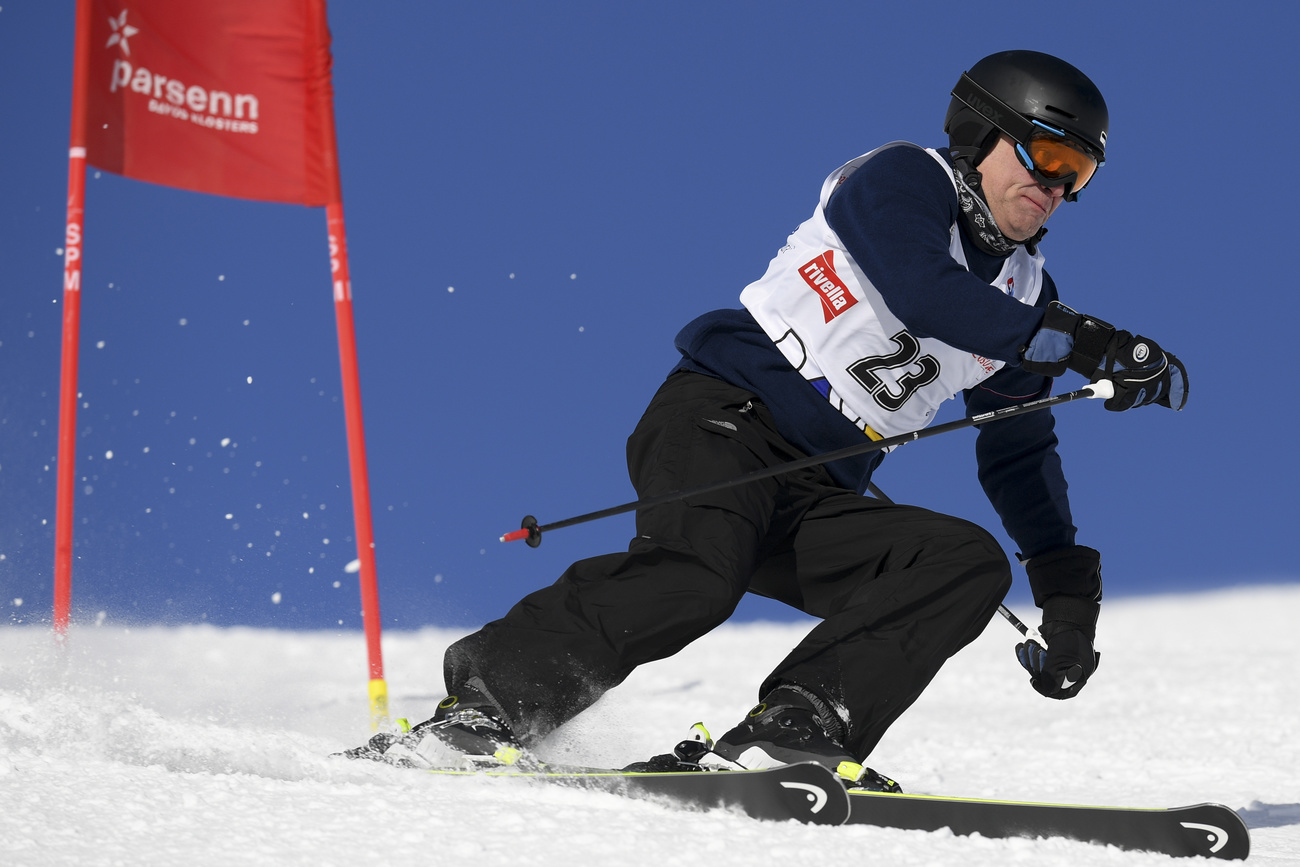
Experience vs. enthusiasm: contest to find new Swiss government minister

The race to succeed Alain Berset in the Federal Council is shaping up to be a close one. While Beat Jans, president of the Basel City cantonal government, is a slight favourite, Jon Pult from canton Graubünden could win the race with his youth and enthusiasm.
On the political front, the two candidates for the left-wing Social Democratic Party ticket to succeed the outgoing interior minister, Alain Berset, have similar profiles. Beat Jans from canton Basel and Jon Pult from canton Graubünden are supporters of the European Union (EU) and have a strong ecological perspective.
Both Jans and Pult are often categorised as being to the left of their party demographic. However, their political profiles on the Smartvote online voting tool show that they are rather in the centre of the Social Democratic Party, although Pult leans slightly more to the left. While in parliament, both men rarely deviated from their party lines, voting with the Social Democratic Party more than 99% of the time.
Both also have approachable personalities that have an appeal beyond their political identities. After 18 rounds of voting and hours of suspense, the successful candidates Jans and Pult graciously acknowledged the four non-successful candidates.
Two decades separate the two men: Jon Pult is 39-years-old and Beat Jans, 59. It is perhaps this number that will make the difference in the federal parliament decision on December 13.
Beat Jans: bridge-builder
“I never imagined I would one day be a candidate for the Swiss Federal Council,” Beat Jans told reporters moments after being nominated by his peers. Jans comes from a working-class background. His mother was a shop assistant and his father a locksmith. He gives an air of simplicity and spontaneity. As he made his way to the pressroom after his nomination, flanked by cameras, he didn’t hesitate to kiss his wife when he saw her.
“I want to build bridges, in particular to bridge the growing gap between the villages and cities,” said Jans. He says he wants to make sure the voices of the cities are better heard in the government. His roots in the economically strong canton Basel City is an advantage. His election would see his home canton regain a place in the Federal Council after a 50-year absence.

Jans’s main strength, however, is his long political career. He was a member of the House of Representatives for ten years prior to his election to the Basel City government in 2020, which he has chaired ever since. Prior to that, he was a member of Basel City’s parliament and was vice-president of the Social Democratic Party between 2015 and 2020.
His experience is recognised beyond his own political party and makes him a strong favourite. “Beat Jans has the advantage of being familiar with the workings of a parliament and a government,” says parliamentarian Christine Bulliard-Marbach from The Centre party. But the fact that he has not been a member of the Swiss parliament for three years could work against him, as he has undoubtedly lost some of his network.
Jans began his working life as a farmer’s apprentice. He trained as an agricultural technician before studying environmental sciences at the federal technology institute ETH Zurich.
This background should appeal to Switzerland’s strong farming lobby. When he was in Bern, however, his left-leaning environmental ideology did not leave a positive impression with the farming unions, to which he might now have to give certain guarantees to curry their favour. “I didn’t get the impression that he supported our community,” says Pierre-André Page, a member of the right-wing Swiss People’s Party.

When asked about his priorities if elected, Jans said everything would depend on which department he would have to lead. However, he believes that the ongoing negotiations between Switzerland and the European Union need be brought to a swift conclusion in order to stabilise their relations. “I represent Basel City, which is situated at the border of three countries. I’ve learned that it’s easier to solve problems with our neighbours than without them,” he says.
He is particularly sensitive to the needs of the Swiss Abroad. “My brother lives in New York, and my wife is of American origin”, he points out. He therefore believes that the Swiss Abroad must be able to remain connected to their home country.
For this reason, Jans is a proponent of e-voting, as it would make it easier for the Swiss Abroad to participate in political life. “We need to move forward wisely. If we can solve the technical problems, I think that’s the future,” he says. According to Smartvote, in 2019 he answered “rather yes” to the question of whether the introduction of e-voting should be continued.
A keen sportsman, he met his wife in Hawaii, where he planned to learn to surf. However, after being hit on the head with a surfboard, he opted instead to go for a hike. That’s how he met his wife Tracy, originally from Miami, he told the German-language weekly Schweizer Illustrierte.External link The couple have two daughters, aged 16 and 18.
>> A portrait of the two candidates by Swiss public television RTS (in French).
Jon Pult: the representative of diversity
“With my candidacy, I want to represent diversity and strengthen the cohesion of our country,” said Jon Pult after his party nominated him for the race for the Federal Council.
The parliamentarian from canton Graubünden indeed represents the linguistic diversity of Switzerland. He says he is trilingual, speaking Italian, Romansh and German, but he is also fluent in French. This is an undeniable asset when it comes to governing a multilingual country. “I believe a command of languages is a central criterion for a Federal Councillor,” says Christine Buillard-Marbach, who intends to test the candidates on this point.

Pult grew up between Graubünden and Milan. His mother is an Italian art historian and his father is Swiss. He has dual citizenship in Italy and Switzerland and has no intention of giving up his Italian passport. “I was born with dual nationality and I intend to die as such,” he told the newspaper BlickExternal link, while guaranteeing he is “100% loyal to Switzerland”.
He is often described as a “gifted politician” and has had a dazzling political career. In the early 2000s, he became involved with the Young Social Democrats. In 2005, he was elected to the parliament of the city of Chur in canton Graubünden, then to the cantonal parliament in 2010, before being elected to the federal parliament in 2019. Between 2009 and 2016, he chaired the Graubünden section of his party and is currently vice-president of the Social Democratic Party.
Aged 39, it is a remarkable political career. However, there is a notable position missing: he has no experience in government. This is certainly a disadvantage, but not big enough to alienate all votes. “He’s young and dynamic. With the support that federal councillors have he should get the hang of it quickly,” says Pierre-André Page.
Alternatively, Pult has been known to use his youth as an argument in his favour. When asked about the focus on his age, he jokes: “It’s a good remedy for the mid-life crisis”. As such, he is hoping to bring a breath of fresh air to the government, offering not only a younger perspective but also experience in the private sector.
For almost seven years, he has worked as a strategy and communications consultant for the Zurich agency Feinheit. He is now devoting his time to politics, although he still sits on the company’s board of directors. “It’s good for Switzerland to have a member of the Federal Council who has an idea of what modern participative leadership can look like,” he says.
However, his support and chairmanship of the Alpine Initiative, an association whose aim is to protect the Alpine ecosystem, could cost him valuable votes on the right. Jean-Claude Addor, a People’s Party parliamentarian from canton Valais, described him as a “gravedigger of the peripheral regions” in an interview with Swiss public television, RTSExternal link.

Reforming the healthcare system without cutting benefits, meeting climate targets and stabilising relations with the EU will be his priorities if elected. He also intends to support the development of e-voting. “The Swiss Abroad is of great importance, and I believe that Swiss people all over the world should be able to vote,” he says.
Rather discreet about his private life, Jon Pult is married to SWI swissinfo.ch journalist Sara Ibrahim and lives between Chur and the Swiss capital. But it is perhaps his talents as a communicator and his closeness to the people that stand out the most. One of his political opponents from his home canton Graubünden, Rudolf Kunz of the Radical-Liberal Party, once praised Pult’s “fabulous skills as a bistro barfly” in an article in the Neue Zürcher Zeitung (NZZ) newspaper. And it was actually a compliment: he meant that Jon Pult “can get along with anyone”.

In compliance with the JTI standards
More: SWI swissinfo.ch certified by the Journalism Trust Initiative















![The four-metre-long painting "Sonntag der Bergbauern" [Sunday of the Mountain Farmers, 1923-24/26] had to be removed by a crane from the German Chancellery in Berlin for the exhibition in Bern.](https://www.swissinfo.ch/content/wp-content/uploads/sites/13/2025/12/01_Pressebild_KirchnerxKirchner.jpg?ver=a45b19f3)















You can find an overview of ongoing debates with our journalists here . Please join us!
If you want to start a conversation about a topic raised in this article or want to report factual errors, email us at english@swissinfo.ch.